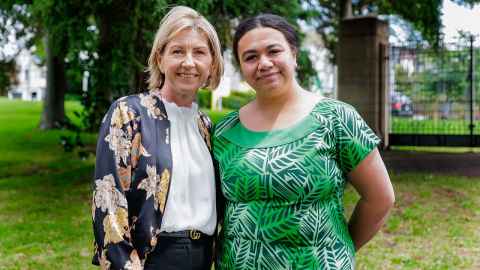New group aims to improve care for preterm babies
5 December 2022
Equitable care for mothers and babies at risk of preterm birth is the aim of new alliance of healthcare providers and consumers.

A collective of health providers and consumers aiming to improve care for mothers and babies at risk of preterm birth is launching.
In Aotearoa New Zealand, around 4500 births per year (7.9%) are preterm, before 37 weeks of gestation. Preterm birth is a leading cause of perinatal death and may also be associated with lifelong disability, and poor health and wellbeing.
“The main driver for the collaborative is the differences we see in care and outcomes for mothers and their babies born preterm across Aotearoa,” says Associate Professor Katie Groom from the University of Auckland’s Liggins Institute.
These differences continue to be reported annually by the Perinatal and Maternal Mortality Review Committee, Dr Groom says.
“At an initial meeting, health sector and community providers realised we shared a strong desire to improve that care, and the systems that support it, in an equitable way.”
After several years of preparatory work, ‘The Carosika Collaborative – Taonga Tuku Iho’ is celebrating its official launch at its first education event on 8 December 2022, which will be followed by a stakeholder consultation hui on 9 December, both in south Auckland.
The name ‘Carosika’ was gifted to the group by Tina Allen-Mokaraka and Tasi Wilson in memory of their daughter, Carosika, who was born unexpectedly early on 9 August 2014 at almost 24 weeks’ gestation. She passed away shortly after birth. Her name sits alongside ‘Taonga Tuku Iho’, also gifted by Tina and Tasi’s whānau, to represent the treasure of her legacy and that of other preterm babies.
Tina and Tasi became involved after hearing about other preterm babies and research-based interventions that had helped them to survive. While Dr Groom was able to reassure the couple about the decisions they made, they want to ensure other families and whānau at risk of preterm birth have the right pregnancy care.
Data from 2020 show that, while the total rate of preterm birth in New Zealand is 7.9 percent, it differs by ethnic groupings:
- 9 percent for Māori
- 8.1 percent for Pacific
- 8.8 percent for Indian
- 7.3 percent for Asian (excluding Indian)
- 7.1 percent for European.
There are also differences by region from 5.6 percent to 13.1 percent across the former district health board areas.
“We have set ourselves a target of a 20 percent reduction in preterm birth over the next five years, but our commitment is really to equity,” Dr Groom says. “So, to achieve a reduction in preterm birth from 7.9 percent to 6.3 percent for all, we will need to achieve a 30 percent reduction for whānau Māori.”
Other key markers of success will be the proportion of women who book for pregnancy care in the first 12 weeks of pregnacy and how many mothers receive corticosteroid treatment before a preterm birth to assist with babies’ lung development.
There are a number of ways in which the Carosika Collaborative will aim to achieve these goals including education for women and whānau and their healthcare professionals, as well as the development of a best practice guide to support nationally consistent care.
“Our work to develop a best practice guide is funded by the Health Research Council of New Zealand. Through this research we will work with women, whānau and health professionals across Aotearoa to better understand their enablers and barriers to care and develop the resources and tools that support improved and more consistent care,” Dr Groom says.
Similar alliances have been formed in the UK and Australia aiming to reduce the rate of preterm births and are government funded.
The Carosika Collaborative will require ongoing support to achieve its goals.
The main aim of the Carosika Collaborative is that, whoever you are and wherever you live in Aotearoa, you and your baby have the same opportunity for the best care and outcomes for preterm birth.
Media queries
Liggins and FMHS media adviser Jodi Yeats
M: 027 202 6372
E: jodi.yeats@auckland.ac.nz